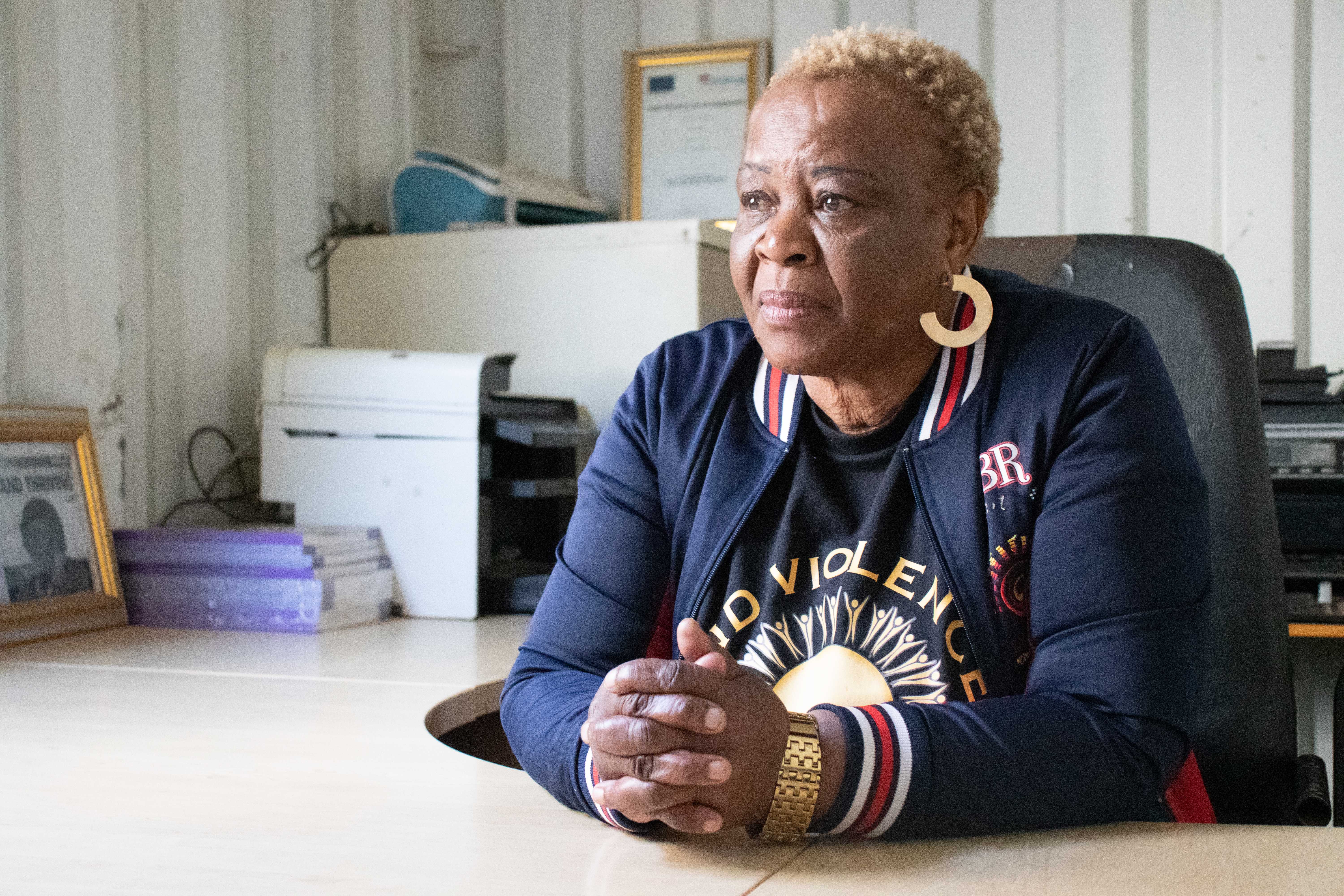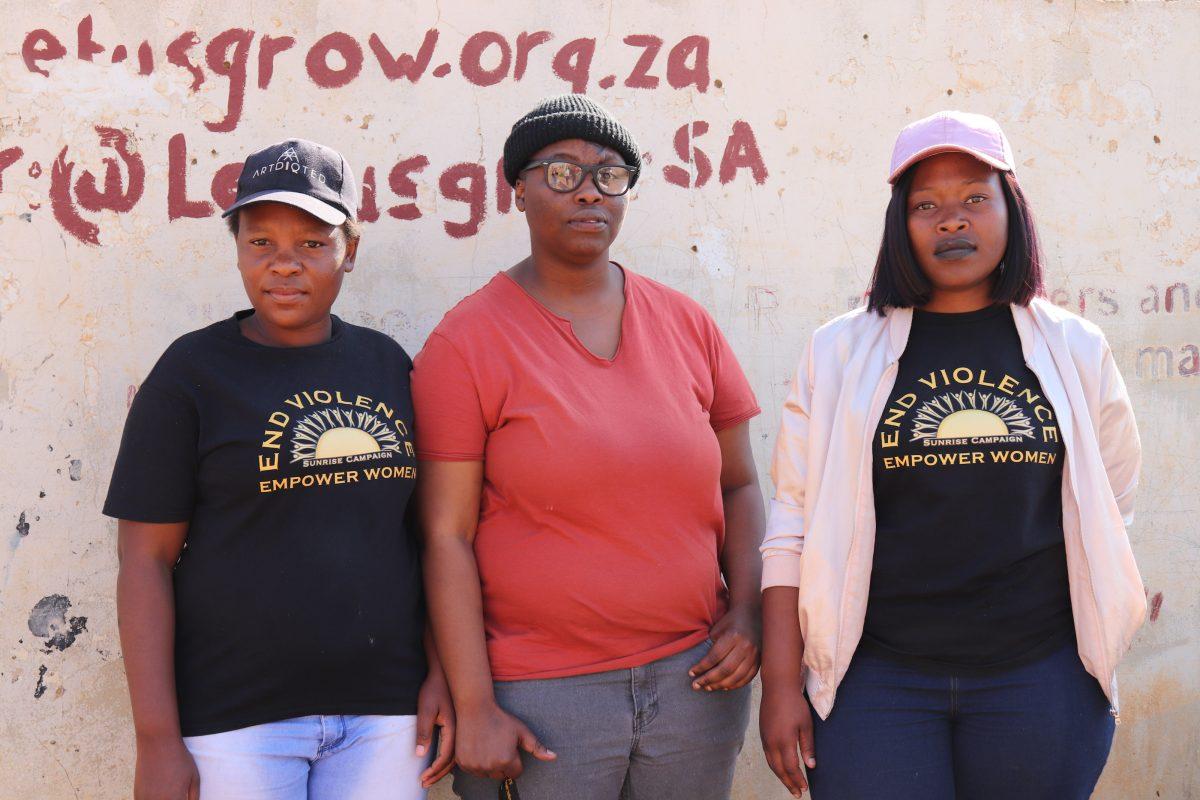Orange Farm, South Africa — Two months ago Nokuthula Zwane, 24, was raped for the third time.
She decided there was no point in reporting the crime–a gang rape by six men–to police.
Zwane was 18 years old when she was raped the first time. She said she reported the crime to police, but after they took evidence, nothing was done. The second time she was raped, she said the police refused to take evidence because she was not penetrated by genitalia. According to South African Criminal Law, sexual penetration of any kind is considered rape.
“I said, ‘I’m not going there ’cause I know what’s going to happen,” Zwane said. “The very same thing that happened [the] two times back is going to happen, so what’s the point? Let me just cry, and then I’m fine. Life goes on.”
Zwane found support in the women who are part of The Sunrise Campaign, the latest project of the organization Let Us Grow. One of the aims of The Sunrise Campaign is to address the gender-based violence issues that plague Orange Farm, a large township about 45 kilometers (27 miles) south of Johannesburg.
Rose Thamae, 66, best known as Mum Rose, created Let Us Grow in 1996 as a home-based care support organization for HIV positive people living in Orange Farm.
Thamae, a two-time rape survivor who has been HIV positive for 29 years, was driven by her own experiences. She was raped for the first time by her father’s friend when she was nine years old. She told no one. Ten years later, she was gang raped.
After Thamae was diagnosed with HIV, she moved to Orange Farm to escape the stigma and discrimination that came from her diagnosis.
“In the 1990s, when they say you are HIV positive, the doctor will tell you look after yourself until you die because there was no treatment,” Thamae said. “When I was still staying here, I saw it was good for me to attend a separate group. That’s when it started shaping this project. I trained as a counselor to counsel people when they’re diagnosed with HIV.”
Thamae called The Sunrise Campaign her “new baby.”
“When I introduced it, I said, everything that is happening in this center is something that you are seeing from the community,” Thamae said.

For women in the Orange Farm community, gender-based violence is all too familiar.
In the 2017-18 year, there were 40,035 rapes reported across South Africa, according to statistics released by the South African Police Service (SAPS). Those statistics do not address the many women like Zwane who do not go to police after they have been raped.
In fact, according to Rape Crisis Cape Town Trust, an organization that guides victims of sexual violence through the criminal justice system, nearly 650,000 sexual offenses are committed in South Africa every year. Of those, only one in 13 is reported to police. That means almost 90% of sexual offenses go unreported.
“In the last 10 years we have seen a great decrease in reports of sexual violence,” said Aisha Hamdulay, the media and communications liaison at the Women’s Legal Centre in Cape Town, in an email to The Hawk. “However, the decrease in reports is not indicative of a decrease in sexual violence but rather distrust and a loss of faith in the legal system. This loss of faith has averted many women from reporting sexual violence.”
One of the initiatives within The Sunrise Campaign is a support group for survivors of gender-based violence. Zwane leads that group.
“We talk about everything and anything, even if could just be clothes, perfumes, anything to get over whatever we are feeling,” Zwane said. “I think it helps. The majority of people are doing well.”
Nokuthula Mabongo, 26, another Orange Farm resident, is not convinced that Zwane is doing as well as she says she is.
“How can she just get over it?” Mabongo said. Mabongo tried to convince Zwane to report her third rape to the police, but Zwane refused.
What Mabongo thinks women like Zwane need is justice. But Mabongo acknowledges the system is broken, and black women, who are at “the bottom of the hierarchy,” are the ones most likely to experience gender-based violence.
“This is what I’m saying,” Mabongo said. “Justice comes into play. It’s failing women. How do I make you believe you’ll receive the justice that you deserve? We know how the statistics are standing in the country as a whole. We know how many women are raped in South Africa every day, how many people are prosecuted because of rape.”
Sphiwe Ramaphuma, 29, another survivor and member of the support group, is familiar with the broken justice system.
When Ramaphuma was raped at 19 years old, she said she faced the same indifference as Zwane when she reported the crime to police.
“When we got there, the policemen didn’t want to hear our stories,” Ramaphuma said. “We were asked, ‘What did you wear? What were you doing? How did it happen?’ You can’t even explain how did you get raped.”
Thamae said little has changed since her own rapes.
“If 20 years down the line, women and children are being gang raped like me, and we are losing the cases, to me, it’s not getting better,” Thamae said. “We are still losing our sisters. To me, the systems are failing.”
The lack of justice means Zwane and Ramaphuma are still forced to see their attackers in Orange Farm.
Mabongo said the current justice system favors people who have money and resources.
“The justice [system] is not something that an ordinary black woman can tackle,” Mabongo said. “The justice system, it’s not for people like us, it’s for people with money and status and power and resources. People here don’t have those things.”
The women are not convinced they can do anything to change the justice system, so they focus instead on each other.
“We need to do it ourselves in our communities in the way that we can,” Mabongo said. “We know that the issue here is that women get raped. We need to tackle that in our own way, in a way that’s going to help our women.”
That means changing deeply rooted cultural attitudes and the entitlement that many men feel they have over women.
“There’s this culture issue of us as black people,” Thamae said. “Your father is a man, your mother is obeying your father, and your mother has no voice. This boy is growing looking at what the father is doing, and he’s coming to do it to you as a young woman. Many boys say, ‘My father told me I am a man. No woman can tell you.’ We started this program to say, ‘Hey, wake up guys. You are not going to live like your father.’”
Another aspect of The Sunrise Campaign is its focus on educating young boys in order to reduce gender-based violence in the next generation.
“[If] boys can be groomed from that age when we were groomed from, then maybe the next generation of men will be different kind of men,” Mabongo said.
The campaign also seeks to give women a voice, Thamae said.
“It’s not to say this gender-based violence is starting now,” Thamae said. “It’s been here a long time. It’s only that those women never talked about it. They were told not to. You can see coming into the house that your mother and father were fighting. They were always pretending they were ok. Gone are the days of pretending. We are losing so many sisters, so many mothers, so many young girls.”















































kim faguy • Jun 24, 2019 at 2:11 pm
Wonderful article. Let’s hope it can make a change. Hope to see more from the two of you.